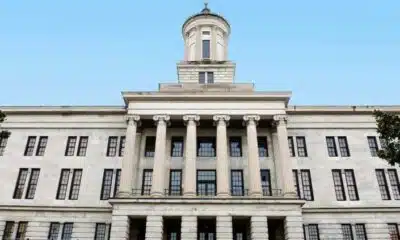News from the South - Alabama News Feed
Anti-abortion leader argues US was not ready for Roe or Dobbs decisions
by Sofia Resnick, Alabama Reflector
July 5, 2025
Despite heading one of the oldest anti-abortion organizations in the country at a time of huge upheaval for abortion rights, John Mize is new to the movement.
The father of four became the CEO of Americans United for Life in January 2024. Previously he worked for the Crohn’s & Colitis Foundation, after more than a decade in the for-profit health care sector. Mize said he didn’t grow up in what’s traditionally known as the “pro-life” movement, but he was drawn to this position because of his Christian faith and his involvement in the foster care community.
“My wife and I have been foster parents for like a decade; we’ve had a lot of kids in our house,” Mize said. “I come from very humble origins. My mom was pregnant with me, and my biological father cheated and left her with two little boys and me, and she chose to give me life.”
AUL is older than its CEO by more than a decade, founded two years before the U.S. Supreme Court established federal abortion rights in Roe v. Wade in 1973. The organization published legal strategy on how to reverse Roe through the courts, while steadily helping to pass and then defend hundreds of state laws that incrementally affixed regulations and gestational limits to pregnancy termination, making abortion increasingly harder to access. Currently, AUL is pushing restrictions on medication abortion at the federal and state level. Mize previously told States Newsroom that when he interviewed for the position at AUL he talked about using insurance claims data to research harms of medication abortion.
John Mize, CEO of Americans United for Life, said the group would continue pushing state and federal policies that make abortions harder to provide and access and would help pass a bipartisan federal bill to help fund birth costs. (Courtesy of John Mize)
The organization’s dominant message is that women are victims of abortion and are preyed on by organizations that provide abortion, like Planned Parenthood. In its catalog of anti-abortion model legislation, AUL has a section called “Defunding Abortion.” The group filed an amicus brief in Medina v. Planned Parenthood South Atlantic, in which the U.S. Supreme Court just ruled that Medicaid patients don’t have the right to sue to see the doctor of their choice. The decision will allow South Carolina, and likely other states, to exclude from government health programs any reproductive health clinic that also offers abortion. At issue in the case, South Carolina’s governor had removed abortion clinics from its list of Medicaid providers, but the services covered were not related to abortion. Reproductive health advocates expect far-reaching impacts from the decision, combined with proposed cuts affecting reproductive health clinics in the federal reconciliation bill still working its way through Congress.
“Now, more states can move forward with their plans to defund Planned Parenthood,” Mize wrote in an email newsletter after the Medina decision.
Going into the third year that Dobbs v. Jackson Women’s Health Organization’s widespread effects ripple throughout the country, Mize said AUL would continue incrementally pushing state and federal policies that make abortions harder to provide and access. Mize said AUL is also eager to help pass a bipartisan federal bill to help fund birth costs. When it comes to some of the reported consequences of Dobbs, like miscarriage treatment denials, Mize said some clarity in laws are likely needed. But he, like other leaders and doctors who oppose abortion, believe it is the responsibility of medical associations like the American College of Obstetricians & Gynecologists (ACOG) to create state-specific guidelines around abortion bans.
“Clinicians should be 100% protected in providing miscarriage care,” Mize said. “If it’s an area where there is still ambiguity, I would think the medical societies would be the best place to go to help clear up that ambiguity.”
ACOG has published post-Dobbs guidelines, including guidance on health exceptions in abortion bans, which says “the practice of medicine … cannot be distilled down to a one-page document or list that is generalizable for every situation,” and encourages doctors to focus on a patient’s individual circumstances over a state’s law. ACOG has also published questions for hospitals systems and guidance addressing prelabor rupture of membranes (PROM) and when abortion care might become necessary.
In an emailed statement, an ACOG spokesperson said, “ACOG cannot and does not provide legal advice to its members. ACOG’s clinical guidance is based on scientific evidence and data, and science does not change based on state laws.”
This interview with Mize was edited for brevity and clarity.
States Newsroom: How would you characterize this period since Dobbs?
John Mize: I would say there’s been significant wins. There’s been significant setbacks. It’s a much more complicated world than it was. Certainly I don’t believe that Dobbs resolved the issue. I think the best thing that came out of Dobbs, from our perspective, is that there’s not a constitutional right to abortion, but now we’re in this very complex world where you have different states that have different populations and popular support for different laws.
SN: The stories of women that have come out having been denied miscarriage care, do you recognize that as a problem, as a consequence of these state bans?
JM: Yeah … any potential ambiguity needs to be flushed out if it hasn’t already, stripping away as much as possible the agendas on both sides.
The laws are not super complicated across the country. There’s no law that should prosecute a woman for a D&C. There’s no law that disallows a woman that is having a miscarriage from receiving treatment. Now, with that being said, there might be confusion at the clinic level, and that’s where the guidance from medical societies is really important. And they’re not providing that guidance. So, I point the finger, largely at medical societies, like ACOG, for example, not providing really clear guidance about what the law says, even though the laws, again, the law’s not super complicated. In Texas, for example, I think it’s like a couple of paragraphs. It’s very clear what the law says.
[Editor’s note: After Texas banned abortion, dozens of women testified that their medically necessary abortions were delayed or denied, and at least three women died. This year the legislature passed a clarification to the law called the Life of the Mother Act, which allows abortion if the pregnant woman has a“life-threatening physical condition aggravated by, caused by, or arising from a pregnancy that places the female at risk of death or poses a serious risk of substantial impairment of a major bodily function.” The law notes that “a life-threatening physical condition is not necessarily one actively injuring the patient.”]
SN: Americans United for Life helps write laws that implicate people’s health care, implicate people’s medical treatments. … ACOG was not pushing for these kinds of laws, but you want ACOG to be the ones to try to help states understand them. But at the end of the day, a lot of these abortion bans were not really written by medical providers, right?
JM: I think if you believe that elective abortion is not a medical necessity, then your opinion is going to be a lot different than if you do believe that it’s a medical necessity. And so we hold a very strong opinion that it’s not a medical necessity, that it’s elective. And because of that, honoring the dignity of human life in the womb changes our opinion significantly in that regard, because then it becomes an ethical issue and a moral issue, and more than a healthcare issue.
SN: I’ve been talking to some of the organizations and activists that track pregnancy criminalization, like Pregnancy Justice. … And there have been a couple of these cases where pregnancy outcomes have resulted in charges — they’re not necessarily charged under abortion bans, but the thesis is that with the escalation of abortion bans, more prosecutors are emboldened to charge women for their outcomes. Even if they’re not charging them for the death of the fetus, they’re charging them for something.
JM: I absolutely loathe the idea of prosecuting women, even women that have had abortions. I don’t feel like we are in any sort of capacity to make an assumption as to why a woman has gotten an abortion. In fact, we should be doing the opposite of persecuting. We should be offering to provide post-abortive support services for that woman, because, again, you don’t know what’s happened. She could have been coerced. She could have been forced to have an abortion. She could be absolutely in a very difficult financial situation.
SN: How do you think that AUL has helped people who might have chosen abortion because of their finances or because they were in a domestic or abusive situation, or all the reasons that people choose abortion? How do you think in these past three years, AUL has helped more people avoid abortion and have their babies?
JM: I mean, you look at states that have implemented good pro-life policy, and I think you do see a decrease in the abortive rate.
[National abortion rates have increased since Dobbs, according to abortion-rights organizations like the Guttmacher Institute and the Society of Family Planning, but there are record rates of patients traveling to other states for abortion, as well as accessing abortion medication via telemedicine.]
And, I think it’s policies like Make Birth Free that are super important, and we need to be doing more of them. We also were very active in the extension of the Child Tax Credit. I’m a firm believer in the baby bonus. And the next thing I’d love to begin addressing, from a policy perspective, is, how can we further encourage marriage.
[Make Birth Free refers to a policy recommendation from AUL, which alongside groups like ACOG has endorsed a bipartisan bill in Congress that would require private health insurance companies to fully cover the costs of childbirth and related maternity care.]
SN: With Make Birth Free, what do you see the prospects of that passing?
JM: I think there’s a lot of momentum. We’ve got to get through this big bill and reconciliation, and I think that the attention is going to be drawn to what’s next. This is bipartisan. It has some really big names backing it, and I know there’s an effort in the House to move legislation, as well. So, as they run up to the midterms, they’re going to be looking for things that they can say, “Hey, we were bipartisan, we’re helping families.” So I think there’s actually an opportunity to get this piece of legislation passed.
SN: When it comes to the One Big Beautiful Bill and some of the projected cuts to Medicaid and some of the moves with Title X, what do you think about that in terms of the goals of trying to make it easier for people to have babies when they want to?
JM: Certainly I believe that Medicaid reform is absolutely needed. I have two children on Medicaid. I have a child with a disability, and I have a child that we adopted from foster care. And unfortunately, the way that the reimbursement structure is established from the Affordable Care Act, healthy individuals who are enrolled into Medicaid are reimbursed at a much higher level from the federal government than my daughter and my son, and so there’s an incentive to enroll healthy, able-bodied adults into Medicaid. That to me, that’s where we need to solve the problem, and in fact, I think in doing so, that will vastly increase the benefits for people that really do need Medicaid.
SN: How do you feel about the so-called abortion abolitionist movement?
JM: This idea that we should abolish all abortion; not only is it not very realistic, I think it doesn’t follow where the public is right now.
When the pendulum swings too fast, one way or the other, it will tack back, and that’s something at AUL, we’ve always been incremental in nature, and we don’t believe in getting ahead of public sentiment that would put this country in a position where it’s not ready for, for example, a constitutional amendment on life. Just like I would argue a portion of the country was never ready for Roe, a portion of the country would never be ready for the opposite.
Alabama Reflector is part of States Newsroom, a nonprofit news network supported by grants and a coalition of donors as a 501c(3) public charity. Alabama Reflector maintains editorial independence. Contact Editor Brian Lyman for questions: info@alabamareflector.com.
The post Anti-abortion leader argues US was not ready for Roe or Dobbs decisions appeared first on alabamareflector.com
Note: The following A.I. based commentary is not part of the original article, reproduced above, but is offered in the hopes that it will promote greater media literacy and critical thinking, by making any potential bias more visible to the reader –Staff Editor.
Political Bias Rating: Right-Leaning
This article presents a clear right-leaning bias by focusing on the perspective and activities of Americans United for Life (AUL), a prominent anti-abortion organization. The language emphasizes the organization’s goals to restrict abortion access and portrays abortion providers like Planned Parenthood negatively. It highlights pro-life policies and the CEO’s Christian faith, fostering a sympathetic view toward anti-abortion efforts. While the article includes some contextual information about abortion-rights groups and medical associations, the framing and emphasis primarily support conservative, pro-life positions, reflecting a right-leaning ideological stance.
News from the South - Alabama News Feed
FBI raids Maryland home of Trump critic John Bolton
by Ariana Figueroa, Alabama Reflector
August 22, 2025
WASHINGTON — FBI agents raided the home and office of former Ambassador to the United Nations John Bolton, a one-time adviser to President Donald Trump who has become a frequent critic of the president, to investigate Bolton’s handling of classified documents, according to multiple media reports.
The raid on a former Trump adviser’s house represents an escalation from the Justice Department in targeting critics of Trump, whom he vowed to go after should he return to the White House for a second term.
Speaking to reporters Friday, Trump said he was not briefed on the raid of Bolton’s house in the wealthy suburb of Bethesda, Maryland, and office in Washington, D.C., according to White House pool reports.
But the president noted his longstanding feud with his former adviser.
“I’m not a fan of John Bolton,” Trump said. “He’s a real sort of a low life. He could be a very unpatriotic guy. We’re going to find out.”
Earlier this year, the president revoked the security detail for Bolton, who served as Trump’s national security advisor from 2018 to 2019 and as U.S. ambassador to the United Nations during the George W. Bush administration in 2005 and 2006.
Following his time in the Trump administration, Bolton, who was an important member of the Bush administration’s national security team that favored active military involvement in the Middle East, emerged as a chief Republican foreign policy critic of Trump, authoring a 2020 book that blasted the president and widened the public rift between the two men.
Bolton has not been charged with a crime and is not in custody, according to The Associated Press, which cited a person familiar with the matter.
The first Trump administration launched an investigation into Bolton to probe if he improperly used sensitive information in his book. The current search involves federal officials investigating Bolton’s actions over the last four years, according to the New York Times, which cited a federal law enforcement official.
Trump documents case
Trump himself was prosecuted for mishandling classified documents after the FBI raided his Florida golf course and main residence of Mar-a-Lago in 2022. A federal judge dismissed the resulting criminal charges against Trump.
FBI Director Kash Patel wrote on social media that “NO ONE is above the law,” and that FBI agents were “on mission.”
The FBI declined to comment.
In 2020, the Department of Justice opened a criminal investigation into Bolton’s book and tried to block its publication, but were stymied in court.
Patel also wrote a 2023 book where he lists Bolton, along with a dozen other people, as members of the “deep state” who are working against Trump, according to the Times.
Alabama Reflector is part of States Newsroom, a nonprofit news network supported by grants and a coalition of donors as a 501c(3) public charity. Alabama Reflector maintains editorial independence. Contact Editor Brian Lyman for questions: info@alabamareflector.com.
The post FBI raids Maryland home of Trump critic John Bolton appeared first on alabamareflector.com
Note: The following A.I. based commentary is not part of the original article, reproduced above, but is offered in the hopes that it will promote greater media literacy and critical thinking, by making any potential bias more visible to the reader –Staff Editor.
Political Bias Rating: Center-Left
This content presents a factual and detailed account of the FBI raid on John Bolton, a former Trump adviser turned critic, and provides context about Bolton’s history with Trump and his actions post-administration. It highlights the conflict between Trump and Bolton, includes direct quotes from Trump that are critical of Bolton, and references investigations into classified documents related to both men. While it covers perspectives from both sides and notes legal outcomes such as dismissed charges, it subtly emphasizes alleged abuse of power and retaliation by the Justice Department against Trump’s critics. This leads to a center-left lean, aiming for critical scrutiny of Trump and his administration while avoiding overtly partisan language.
News from the South - Alabama News Feed
Grants to boost local emergency alert systems in question as public media agency closes
by Jennifer Shutt, Alabama Reflector
August 20, 2025
WASHINGTON — The Corporation for Public Broadcasting will no longer administer a grant program that has so far provided millions of dollars to local television and radio stations to upgrade the equipment they use to send out emergency alerts.
The change comes after Republican lawmakers voted last month to defund the corporation, following a request from President Donald Trump to zero out more than $1.1 billion in previously approved spending for the organization.
Congress originally formed the Next Generation Warning System grant program in fiscal 2022 and provided the Federal Emergency Management Agency about $40 million during its first year.
FEMA then gave that money to CPB to reimburse stations for infrastructure and other improvements meant to get emergency alerts sent through the Integrated Public Alert and Warning System to more Americans.
That appears on track to change in the months ahead.
FEMA officials wrote in a notice of funding opportunity for the current fiscal year that the grants will now go directly to state and tribal governments that can then award funding to public broadcasting stations that make improvements to their emergency alert systems.
Democrats and some Republicans have raised concerns that without funding from the Corporation for Public Broadcasting, local stations wouldn’t be able to raise enough funding to remain in operation, potentially leading to holes in the country’s emergency alert system.
‘Rescission consequences’ for local public media
CPB, which plans to cease operations later this year, announced this week that it would no longer be able to administer the grant funding Congress approved during fiscal 2023 and 2024. The corporation had yet to determine which applicants would receive the funding lawmakers provided for those two years.
“CPB has been fully invested in the NGWS program and its mission to protect the American public,” CPB President and CEO Patricia Harrison wrote in a statement. “This is one more example of rescission consequences impacting local public media stations and the communities they serve—in this case, weakening the capacity of local public media stations to support the safety and preparedness of their communities.”
That could potentially leave much of the $136 million in grant funding approved by Congress in limbo.
CPB wrote in a statement that “FEMA should assume responsibility for disbursing the funds as Congress intended, or most of the FY 2022 funding—and all funds from FY 2023 and FY 2024—will go undistributed.
“As a result, critical emergency alerting equipment will not be purchased, leaving communities, especially those in rural and disaster-prone areas, without the upgrades Congress intended.”
A FEMA official, speaking on background, couldn’t say definitively how the agency would handle funding for those three fiscal years.
The White House and Office of Management and Budget did not immediately respond to requests for comment from States Newsroom on Wednesday about the grant program.
Projects funded so far include:
- Mid-South Public Communications Foundation in Cordova, Tennessee, which received $1.657 million to “replace a transmitter and two emergency generators to ensure the rural agricultural communities in Tennessee, Mississippi, and eastern Arkansas receive timely emergency communications.”
- Blue Ridge PBS in Roanoke, Virginia, which received $1.122 million to “replace critical broadcast infrastructure that will strengthen their signal in the mountainous region to reach more rural communities with targeted emergency alerts.”
- Louisiana Public Broadcasting, which received nearly $2 million to “install transmitters and antennas for KLTL-TV in Lake Charles and KLTM-TV in Monroe and update alerting equipment to enable statewide delivery of alerts and warning messages.”
Congress votes to end public media funds
Kate Riley, president and CEO of America’s Public Television Stations, released a written statement this week calling CPB’s inability to administer the grant program for FEMA “yet another devastating result of the rescission of public media funding.”
She also called on FEMA “to establish a new process for delivering this funding to public broadcasters” and urged “Congress to restore essential direct funding to local stations throughout this country whose communities depend on them for lifesaving public safety services, proven educational resources and essential community connections.”
Trump sent Congress a rescissions request in early June, proposing lawmakers eliminate previously approved funding for the Corporation for Public Broadcasting and several foreign aid accounts.
The House voted mostly along party lines to approve the full $9.4 billion proposal later that month. GOP senators, except Maine’s Susan Collins and Alaska’s Lisa Murkowski, approved a similar bill in July after removing spending cuts to the President’s Emergency Plan for AIDS Relief, or PEPFAR. The House voted to clear the revised legislation a few days later, sending the bill to Trump for his signature.
Alabama Reflector is part of States Newsroom, a nonprofit news network supported by grants and a coalition of donors as a 501c(3) public charity. Alabama Reflector maintains editorial independence. Contact Editor Brian Lyman for questions: info@alabamareflector.com.
The post Grants to boost local emergency alert systems in question as public media agency closes appeared first on alabamareflector.com
Note: The following A.I. based commentary is not part of the original article, reproduced above, but is offered in the hopes that it will promote greater media literacy and critical thinking, by making any potential bias more visible to the reader –Staff Editor.
Political Bias Rating: Center-Left
This content presents a critical view of the Republican-led defunding of the Corporation for Public Broadcasting and highlights concerns from Democrats and some Republicans about the negative impact on local emergency alert systems. It emphasizes the consequences of budget cuts initiated by former President Trump and Republican lawmakers, portraying these actions as harmful to public safety and local media. The overall tone and framing suggest a center-left perspective that supports public broadcasting funding and is critical of conservative fiscal decisions affecting it.
News from the South - Alabama News Feed
U.S. agriculture secretary announces end to subsidies for solar panels on farmland
by Sam Stockard, Alabama Reflector
August 19, 2025
This story originally appeared on Tennessee Lookout.
U.S. Agriculture officials announced a new initiative Monday to stop subsidies for solar energy panels that take up farmland while supporting cuts in agriculture grants to Tennessee universities.
Agriculture Secretary Brooke Rollins introduced the initiative by the Trump administration after a Future Farmers of America breakfast at the State Fairgrounds in Lebanon where she said the federal government will make new grants to bolster Tennessee farming while targeting grants that don’t help farmers’ production.
Rollins criticized the Biden administration’s Inflation Reduction Act and “market distorting incentives” for solar panels, which she said are eliminating Tennessee farmland.
The secretary made the statements even though a study by the nonpartisan Tennessee Advisory Commission on Intergovernmental Relations found that solar facilities aren’t likely to be the “primary driver” of development on farmland for decades. The study also determined that land can be returned to farming once a solar facility goes out of use.
Earlier this year, the federal government made dramatic cuts to higher education grants, including eliminating more than $31 million in funding to the University of Tennessee Institute of Agriculture, which houses agricultural research and resources for Tennessee farmers and communities in 95 counties.
Rollins defended the reductions, saying “Those cuts were being made in programs that did not align with the president’s vision of putting farmers first.”
Deputy Secretary Stephen Vaden of Tennessee described the reduction as a “repurposing” and said changes were made in research funding based on whether a grant “helps a farmer in the field make more money.” Projects aimed at “clean energy” or based on “racial criteria” were eliminated, he said.
In addition to stopping solar panel development on farmland, Rollins announced that nearly $89 million will go toward 13 rural development projects in 28 Tennessee counties to “promote partnerships” and infrastructure investments for rural education. The department has distributed nearly $100 million this year to more than 10,000 farmers through the Emergency Commodity Assistance Program, according to Rollins.
Some farmers have said they expect prices to increase because of President Donald Trump’s tariffs, which are forcing them to pass on higher rates to customers. Rollins said Monday the administration has signed eight new trade agreements expected to boost the nation’s economy.
Tennessee Lookout is part of States Newsroom, a nonprofit news network supported by grants and a coalition of donors as a 501c(3) public charity. Tennessee Lookout maintains editorial independence. Contact Editor Holly McCall for questions: info@tennesseelookout.com.
Alabama Reflector is part of States Newsroom, a nonprofit news network supported by grants and a coalition of donors as a 501c(3) public charity. Alabama Reflector maintains editorial independence. Contact Editor Brian Lyman for questions: info@alabamareflector.com.
The post U.S. agriculture secretary announces end to subsidies for solar panels on farmland appeared first on alabamareflector.com
Note: The following A.I. based commentary is not part of the original article, reproduced above, but is offered in the hopes that it will promote greater media literacy and critical thinking, by making any potential bias more visible to the reader –Staff Editor.
Political Bias Rating: Center-Right
The content presents a generally favorable view of policies and officials associated with the Trump administration, emphasizing support for traditional farming interests and criticism of the Biden administration’s approach to solar energy subsidies and grant allocations. While it includes some factual context and opposing data, the framing and focus on defending cuts to higher education grants and promoting rural development align more closely with center-right perspectives that prioritize agricultural production and skepticism of certain clean energy initiatives.
-
News from the South - Texas News Feed6 days ago
New Texas laws go into effect as school year starts
-
News from the South - Florida News Feed6 days ago
Floridians lose tens of millions to romance scams
-
News from the South - Kentucky News Feed7 days ago
AmeriCorps is under siege. What happens in the communities it serves?
-
News from the South - Florida News Feed7 days ago
Protesters go on strike in Israel demanding ceasefire and release of Gaza hostages
-
News from the South - West Virginia News Feed5 days ago
Religious exemption debate front and center amid new school year in WV
-
News from the South - Arkansas News Feed5 days ago
Trump, Zelenskyy exit White House talks hopeful about security guarantee for Ukraine
-
News from the South - Alabama News Feed6 days ago
Final steel girders placed on new Gulf Shores bridge, completion on track
-
News from the South - Alabama News Feed6 days ago
Despite federal shift, state health officials encourage COVID vaccines for pregnant women















































